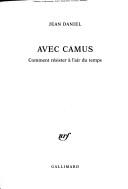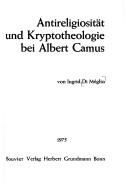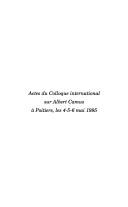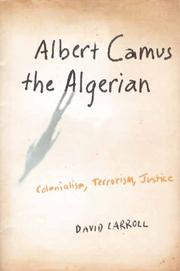Book
ISBN: 3851241401 Year: 1990 Volume: vol 67 Publisher: Innsbruck Verlag des Instituts für Sprachwissenschaft der Universität
Abstract | Keywords | Export | Availability | Bookmark
 Loading...
Loading...Choose an application
- Reference Manager
- EndNote
- RefWorks (Direct export to RefWorks)
Absurd (Philosophy) in literature --- Camus, Albert --- -Philosophy --- -Kamju, Al'ber --- Philosophy --- Camus, Albert, --- Kami︠u︡, Alʹber, --- Kʻa-mu, --- Kamu, --- Chia-mou, --- Jiamou, --- Chia-miu, --- Jiamiu, --- Kʻa-miu, --- Kamiu, --- Albīr Kāmī, --- Kāmī, Albīr, --- Kāmū, Albīr, --- Ḳami, Alber, --- Kamy, Albert, --- Kāmyu, Ālper, --- Kāmyu, Ālpark, --- Mathe, Albert, --- Bauchart, --- Saetone, --- קאמי, אלבר, --- كامو، البير، --- كامي، ألبير --- کامو، البرت، --- Philosophy. --- کامو، آلبر --- Kamju, Al'ber

Abstract | Keywords | Export | Availability | Bookmark
 Loading...
Loading...Choose an application
- Reference Manager
- EndNote
- RefWorks (Direct export to RefWorks)
BPB0701 --- Journalism and literature --- Literature and journalism --- Literature --- Camus, Albert, --- Kami︠u︡, Alʹber, --- Kʻa-mu, --- Kamu, --- Chia-mou, --- Jiamou, --- Chia-miu, --- Jiamiu, --- Kʻa-miu, --- Kamiu, --- Albīr Kāmī, --- Kāmī, Albīr, --- Kāmū, Albīr, --- Ḳami, Alber, --- Kamy, Albert, --- Kāmyu, Ālper, --- Kāmyu, Ālpark, --- Mathe, Albert, --- Bauchart, --- Saetone, --- קאמי, אלבר, --- كامو، البير، --- كامي، ألبير --- کامو، البرت، --- Criticism and interpretation. --- کامو، آلبر --- Camus, Albert --- Kamju, Al'ber
Book
ISBN: 9782081264410 2081264412 Year: 2012 Publisher: Paris: Flammarion,
Abstract | Keywords | Export | Availability | Bookmark
 Loading...
Loading...Choose an application
- Reference Manager
- EndNote
- RefWorks (Direct export to RefWorks)
Pour mettre fin à une légende fabriquée de toutes pièces par Sartre et les siens, celle d'un Camus "philosophe pour classes terminales", d'un homme de gauche tiède, d'un penseur des petits Blancs pendant la guerre d'Algérie, Michel Onfray nous invite à la rencontre d'une œuvre et d'un destin exceptionnels. Né à Alger, Albert Camus a appris la philosophie en même temps qu'il découvrait un monde auquel il est resté fidèle toute sa vie, celui des pauvres, des humiliés, des victimes.Celui de son père, ouvrier agricole mort à la guerre, celui de sa mère, femme de ménage morte aux mots mais modèle de vertu méditerranéenne : droiture, courage, sens de l'honneur, modestie, dignité. La vie philosophique d'Albert Camus, qui fut hédoniste, libertaire, anarchiste, anticolonialiste et viscéralement hostile à tous les totalitarismes, illustre de bout en bout cette morale solaire.
Camus, Albert, --- Kami︠u︡, Alʹber, --- Kʻa-mu, --- Kamu, --- Chia-mou, --- Jiamou, --- Chia-miu, --- Jiamiu, --- Kʻa-miu, --- Kamiu, --- Albīr Kāmī, --- Kāmī, Albīr, --- Kāmū, Albīr, --- Ḳami, Alber, --- Kamy, Albert, --- Kāmyu, Ālper, --- Kāmyu, Ālpark, --- Mathe, Albert, --- Bauchart, --- Saetone, --- קאמי, אלבר, --- كامو، البير، --- كامي، ألبير --- کامو، البرت، --- کامو، آلبر --- Philosophy. --- 960 --- philosophie morale --- littérature française --- libertaire --- levensbeschrijvingen --- biographies et mémoires --- Camus, Albert
Book
ISBN: 9789004302334 9789004302341 9004302344 9004302336 9004302336 Year: 2015 Volume: 18 Publisher: Leiden Boston
Abstract | Keywords | Export | Availability | Bookmark
 Loading...
Loading...Choose an application
- Reference Manager
- EndNote
- RefWorks (Direct export to RefWorks)
Camus, Philosophe: To Return to our Beginnings is the first book on Camus to read Camus in light of, and critical dialogue with, subsequent French and European philosophy. It argues that, while not an academic philosopher, Albert Camus was a philosophe in more profound senses looking back to classical precedents, and the engaged French lumières of the 18th century. Aiming his essays and literary writings at the wider reading public, Camus’ criticism of the forms of ‘political theology’ enshrined in fascist and Stalinist regimes singles him out markedly from more recent theological and messianic turns in French thought. His defense of classical thought, turning around the notions of natural beauty, a limit, and mesure makes him a singularly relevant figure given today’s continuing debates about climate change, as well as the way forward for the post-Marxian Left. This book is also available in paperback.
Philosophy, French. --- Camus, Albert, --- French philosophy --- Camus, Albert --- Kamju, Al'ber --- Kami︠u︡, Alʹber, --- Kʻa-mu, --- Kamu, --- Chia-mou, --- Jiamou, --- Chia-miu, --- Jiamiu, --- Kʻa-miu, --- Kamiu, --- Albīr Kāmī, --- Kāmī, Albīr, --- Kāmū, Albīr, --- Ḳami, Alber, --- Kamy, Albert, --- Kāmyu, Ālper, --- Kāmyu, Ālpark, --- Mathe, Albert, --- Bauchart, --- Saetone, --- קאמי, אלבר, --- كامو، البير، --- كامي، ألبير --- کامو، البرت، --- کامو، آلبر

ISBN: 3416010388 Year: 1975 Volume: 3 Publisher: Bonn : Bouvier,
Abstract | Keywords | Export | Availability | Bookmark
 Loading...
Loading...Choose an application
- Reference Manager
- EndNote
- RefWorks (Direct export to RefWorks)
Camus, Albert, --- Camus, Albert --- -Religion --- -Kamju, Al'ber --- Religion --- Kami︠u︡, Alʹber, --- Kʻa-mu, --- Kamu, --- Chia-mou, --- Jiamou, --- Chia-miu, --- Jiamiu, --- Kʻa-miu, --- Kamiu, --- Albīr Kāmī, --- Kāmī, Albīr, --- Kāmū, Albīr, --- Ḳami, Alber, --- Kamy, Albert, --- Kāmyu, Ālper, --- Kāmyu, Ālpark, --- Mathe, Albert, --- Bauchart, --- Saetone, --- קאמי, אלבר, --- كامو، البير، --- كامي، ألبير --- کامو، البرت، --- Religion. --- Kamju, Al'ber --- کامو، آلبر
Book

ISBN: 2757418742 2757403648 Year: 2017 Publisher: Villeneuve d'Ascq : Presses universitaires du Septentrion,
Abstract | Keywords | Export | Availability | Bookmark
 Loading...
Loading...Choose an application
- Reference Manager
- EndNote
- RefWorks (Direct export to RefWorks)
Albert Camus a vingt-deux ans quand il commence à écrire régulièrement dans ses « Cahiers » ; il ne cessera pas jusqu’à sa mort. Il en préparait alors la publication ; elle sera posthume, sous le titre de Carnets. Ces textes, aussi inclassables que divers (laboratoire de l’œuvre, « choses vues », notes de lectures, impressions de voyages, réflexions philosophiques et, de plus en plus vers la fin de sa vie, notations intimes) sont souvent cités ; ils n’avaient jamais été étudiés en tant que tels. Ils le sont ici, par des chercheurs d’horizons divers, qui interrogent les modalités et les enjeux de cette écriture très spécifique. Les Carnets prennent ainsi toute leur place dans l’œuvre camusienne, dont ils mettent au jour les ressorts secrets. Au cœur de cette écriture fragmentaire, l’exigence artistique de Camus est aussi manifeste qu’ailleurs ; et c’est à ses Carnets qu’en 1937 - il a alors vingt-quatre ans - il confie sa certitude, qui ne se démentira pas : « Écrire, ma joie profonde ! ». Lire les Carnets se révèle indispensable pour qui veut vraiment connaître Camus...
Camus, Albert, --- Notebooks, sketchbooks, etc. --- Camus, Albert --- Kamju, Al'ber --- Kami︠u︡, Alʹber, --- Kʻa-mu, --- Kamu, --- Chia-mou, --- Jiamou, --- Chia-miu, --- Jiamiu, --- Kʻa-miu, --- Kamiu, --- Albīr Kāmī, --- Kāmī, Albīr, --- Kāmū, Albīr, --- Ḳami, Alber, --- Kamy, Albert, --- Kāmyu, Ālper, --- Kāmyu, Ālpark, --- Mathe, Albert, --- Bauchart, --- Saetone, --- קאמי, אלבר, --- كامو، البير، --- كامي، ألبير --- کامو، البرت، --- کامو، آلبر --- Philosophy --- Literature (General) --- écriture --- Carnets d'écrivains --- genèse --- écriture de l'intime

ISBN: 2910351092 Year: 1995 Publisher: Poitiers Editions du Pont-Neuf
Abstract | Keywords | Export | Availability | Bookmark
 Loading...
Loading...Choose an application
- Reference Manager
- EndNote
- RefWorks (Direct export to RefWorks)
War in literature --- Congresses --- Camus, Albert, --- Camus, Albert --- Kamju, Al'ber --- Kami︠u︡, Alʹber, --- Kʻa-mu, --- Kamu, --- Chia-mou, --- Jiamou, --- Chia-miu, --- Jiamiu, --- Kʻa-miu, --- Kamiu, --- Albīr Kāmī, --- Kāmī, Albīr, --- Kāmū, Albīr, --- Ḳami, Alber, --- Kamy, Albert, --- Kāmyu, Ālper, --- Kāmyu, Ālpark, --- Mathe, Albert, --- Bauchart, --- Saetone, --- קאמי, אלבר, --- كامو، البير، --- كامي، ألبير --- کامو، البرت، --- کامو، آلبر --- Criticism and interpretation --- Congresses.

ISBN: 1281927805 9786613792785 0231511760 9780231511766 0231140878 9780231140874 023114086X 9780231140867 0231140878 9780231140874 9781281927804 6613792780 Year: 2007 Publisher: New York Columbia University Press
Abstract | Keywords | Export | Availability | Bookmark
 Loading...
Loading...Choose an application
- Reference Manager
- EndNote
- RefWorks (Direct export to RefWorks)
In these original readings of Albert Camus' novels, short stories, and political essays, David Carroll concentrates on Camus' conflicted relationship with his Algerian background and finds important critical insights into questions of justice, the effects of colonial oppression, and the deadly cycle of terrorism and counterterrorism that characterized the Algerian War and continues to surface in the devastation of postcolonial wars today. During France's "dirty war" in Algeria, Camus called for an end to the violence perpetrated against civilians by both France and the Algerian National Liberation Front (FLN) and supported the creation of a postcolonial, multicultural, and democratic Algeria. His position was rejected by most of his contemporaries on the Left and has, ironically, earned him the title of colonialist sympathizer as well as the scorn of important postcolonial critics. Carroll rescues Camus' work from such criticism by emphasizing the Algerian dimensions of his literary and philosophical texts and by highlighting in his novels and short stories his understanding of both the injustice of colonialism and the tragic nature of Algeria's struggle for independence. By refusing to accept that the sacrifice of innocent human lives can ever be justified, even in the pursuit of noble political goals, and by rejecting simple, ideological binaries (West vs. East, Christian vs. Muslim, "us" vs. "them," good vs. evil), Camus' work offers an alternative to the stark choices that characterized his troubled times and continue to define our own. "What they didn't like, was the Algerian, in him," Camus wrote of his fictional double in The First Man. Not only should "the Algerian" in Camus be "liked," Carroll argues, but the Algerian dimensions of his literary and political texts constitute a crucial part of their continuing interest. Carroll's reading also shows why Camus' critical perspective has much to contribute to contemporary debates stemming from the global "war on terror."
LITERARY CRITICISM / European / French. --- Camus, Albert, --- Camus, Albert --- Kamju, Al'ber --- Kami︠u︡, Alʹber, --- Kʻa-mu, --- Kamu, --- Chia-mou, --- Jiamou, --- Chia-miu, --- Jiamiu, --- Kʻa-miu, --- Kamiu, --- Albīr Kāmī, --- Kāmī, Albīr, --- Kāmū, Albīr, --- Ḳami, Alber, --- Kamy, Albert, --- Kāmyu, Ālper, --- Kāmyu, Ālpark, --- Mathe, Albert, --- Bauchart, --- Saetone, --- קאמי, אלבר, --- كامو، البير، --- كامي، ألبير --- کامو، البرت، --- کامو، آلبر --- Political and social views. --- Political and social views
Book
ISBN: 058518643X 9780585186436 0809310023 9780809310029 Year: 1981 Publisher: Carbondale : Southern Illinois University Press,
Abstract | Keywords | Export | Availability | Bookmark
 Loading...
Loading...Choose an application
- Reference Manager
- EndNote
- RefWorks (Direct export to RefWorks)
Existentialism. --- Existentialism --- Philosophy & Religion --- Philosophy --- Existenzphilosophie --- Ontology --- Phenomenology --- Philosophy, Modern --- Epiphanism --- Relationism --- Self --- Camus, Albert, --- Camus, Albert --- Kamju, Al'ber --- Kami︠u︡, Alʹber, --- Kʻa-mu, --- Kamu, --- Chia-mou, --- Jiamou, --- Chia-miu, --- Jiamiu, --- Kʻa-miu, --- Kamiu, --- Albīr Kāmī, --- Kāmī, Albīr, --- Kāmū, Albīr, --- Ḳami, Alber, --- Kamy, Albert, --- Kāmyu, Ālper, --- Kāmyu, Ālpark, --- Mathe, Albert, --- Bauchart, --- Saetone, --- קאמי, אלבר, --- كامو، البير، --- كامي، ألبير --- کامو، البرت، --- کامو، آلبر --- Philosophy.
Book
ISBN: 0813023874 9780813023878 Year: 1998 Publisher: Gainesville : University Press of Florida,
Abstract | Keywords | Export | Availability | Bookmark
 Loading...
Loading...Choose an application
- Reference Manager
- EndNote
- RefWorks (Direct export to RefWorks)
Love in literature. --- Sex in literature. --- Love in literature --- Sex in literature --- Romance Literatures --- Languages & Literatures --- French Literature --- Camus, Albert, --- Camus, Albert --- Kamju, Al'ber --- Kami︠u︡, Alʹber, --- Kʻa-mu, --- Kamu, --- Chia-mou, --- Jiamou, --- Chia-miu, --- Jiamiu, --- Kʻa-miu, --- Kamiu, --- Albīr Kāmī, --- Kāmī, Albīr, --- Kāmū, Albīr, --- Ḳami, Alber, --- Kamy, Albert, --- Kāmyu, Ālper, --- Kāmyu, Ālpark, --- Mathe, Albert, --- Bauchart, --- Saetone, --- קאמי, אלבר, --- كامو، البير، --- كامي، ألبير --- کامو، البرت، --- کامو، آلبر --- Criticism and interpretation.

 Search
Search Feedback
Feedback About UniCat
About UniCat  Help
Help News
News